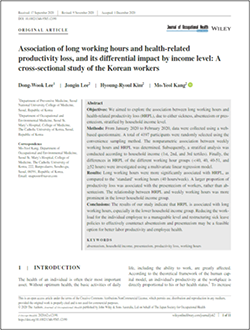#0106 Association of long working hours and health-related productivity loss, and its differential impact by income level: A cross-sectional study of the Korean workers

Long Working Hours Lead to Health-Related Productivity Losses, Especially for the Poor
Poor health negatively affects a worker’s level of productivity, and many recent studies have yielded evidence that working long hours can lead to poor health outcomes. Given these two facts, we hypothesized that long working hours should result in health-related productivity losses.
To test our hypothesis, we developed an online questionnaire that included questions about working hours and health-related productivity losses. Between January 2020 and February 2020, we collected usable questionnaire responses from 3,890 wage-earners living in the Republic of Korea, and we analyzed our data to determine whether those workers reporting longer working hours had greater health-related productivity losses.
The mean number of weekly working hours was 42.4, and 26.6% of the survey respondents reported experiencing health-related productivity losses. As we had hypothesized, workers who reported working longer-than-normal hours also reported greater health-related productivity losses. For male workers, longer working hours correlated with greater health-related productivity losses after a threshold of approximately 40 hours per week. That threshold was 30 hours per week for female workers. Interestingly, most of the health-related productivity losses stemmed from “presenteeism” (i.e., reporting to work but achieving suboptimal performance) rather than absenteeism, and this was particularly true for white-collar workers. The relationship between longer working hours and greater health-related productivity losses was especially pronounced in workers with lower household incomes. A detailed description of our results appears in an article recently published in the Journal of Occupational Health.
Overall, these findings strongly support our original hypothesis of longer working hours leading to greater health-related productivity losses. Based on our findings, we advise that employers should try reducing the workloads of individual employees to a manageable level and restructuring sick leave policies so as to avoid productivity losses due to either absenteeism or presenteeism. Through evidence-based interventions, employers and employees can hopefully arrive at an optimal number of working hours that allows for high productivity without avoidable negative health outcomes.

Link to the original journal article:
https://onlinelibrary.wiley.com/doi/10.1002/1348-9585.12190
Title of the paper:
Association of long working hours and health-related productivity loss, and its differential impact by income level: A cross-sectional study of the Korean workers
Authors:
Dong-Wook Lee, Jongin Lee, Hyoung-Ryoul Kim, and Mo-Yeol Kang




